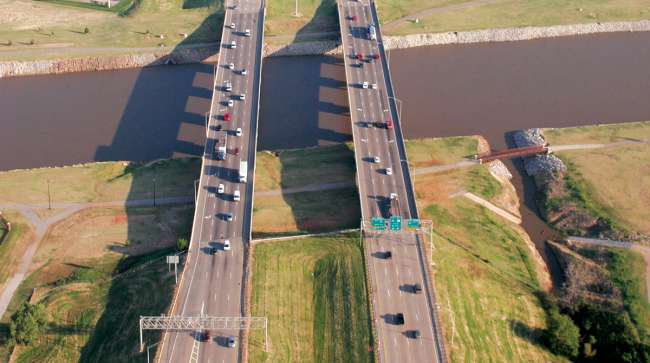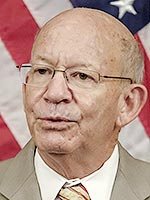Senior Reporter
US House Transportation Panel Approves $547 Billion Highway Bill

[Stay on top of transportation news: Get TTNews in your inbox.]
The transportation committee in the U.S. House of Representatives advanced a five-year, $547 billion surface transportation reauthorization bill that seeks to modernize much of the country’s highway systems.
The Democrat-led panel on June 10 voted 38-26 to pass the highway policy measure, which primarily aims to enhance safety along freight corridors, facilitate access to transit and promote autonomous technologies.
House Democratic leaders say they anticipate considering the highway policy measure prior to July 4, arguing it would mark progress on a pillar of President Joe Biden’s multitrillion dollar infrastructure agenda. The highway measure would update a 2015 highway law, which expires at the end of September.
Rep. Peter DeFazio (D-Ore.), the transportation panel’s chairman and bill sponsor, celebrated the measure’s passage, claiming it represented a departure from status quo-thinking anchored in policy originating from the Eisenhower era.

DeFazio
“These federal dollars mean good family-wage jobs that can’t be outsourced, and support for American manufacturing through the robust ‘Buy America’ standards. But it’s not just how much we invest, but how we invest these funds that will determine whether an infrastructure bill moves our nation in the right direction. As I’ve said many times, we have to move beyond Eisenhower 8.0,” DeFazio said.
“It is my intention to pass this surface bill through the House and have a formal conference with the Senate, in regular order, before the end of September,” the chairman continued.
Republicans on the committee affirmed a need to upgrade the country’s freight and passenger corridors to minimize traffic congestion. Most of them, however, argued the Democrats’ legislation was simply not ideal to achieve such infrastructure updates. Committee ranking member Rep. Sam Graves (R-Mo.), whose GOP alternative to the highway measure was ignored by Democrats, noted, “The House majority is doubling down on last year’s failed process. We’re following the same road map to nowhere: It’s ‘My Way or the Highway’ 2.0. Pretty insane if you ask me, but again, this is not my process and certainly not how I’d do things.”
A Senate version that would provide about $300 billion over five years for highway programs was advanced by a committee in May. Neither version would establish a long-term funding mechanism for a federal highway account essential to state programs.
Specifically, the House highway bill would clear the way for $343 billion in funding for roads, bridges and safety programs, about $100 billion for transit operations, and $95 billion for freight and passenger rail systems. The measure also includes nearly $6 billion in earmarks for projects specific to congressional districts. These include funding for upgrades to coastal infrastructure in New Jersey and expanded highway access in Louisiana.
Provisions in the House bill related to trucking policy include approval of $2.2 billion in contract authority for fiscal years 2023 through 2026 for motor carrier safety grants.
The bill also would direct the Federal Motor Carrier Safety Administration’s administrator to accelerate the modernization of the agency’s information technology and management systems, complete outstanding statutory mandates and undertake a new Large Truck Causation study. And, the bill would require FMCSA to review the impact of hours-of-service rules, such as exemptions and expansions of on-duty time for commercial truck drivers finalized in a 2020 rulemaking.
Additionally, under the bill an incentive grant would be established to encourage states to participate in a comprehensive information systems management program. It would require an assessment about the risks pertaining to untreated obstructive sleep apnea, and it would call for a review of methodology linked to FMCSA’s Compliance, Safety, Accountability program.
Highway Bill by Transport Topics on Scribd
The bill would require the leadership at the U.S. Department of Transportation to further research side underride guards for commercial vehicles, and raise the minimum amount of insurance required for commercial motor vehicles from $750,000 to $2 million.
Several national transportation stakeholders praised the committee’s action. American Road and Transportation Builders Association President Dave Bauer cited the bill’s “historic investments in America’s highways and public transit systems.”
“Time is short as the current transportation funding authorization expires in little more than 100 days,” Bauer said shortly after the panel’s vote. “We urge Congress to move aggressively this summer and pass an outcome-oriented infrastructure bill that boosts U.S. economic productivity and competitiveness.”
Want more news? Listen to today's daily briefing below or go here for more info:




